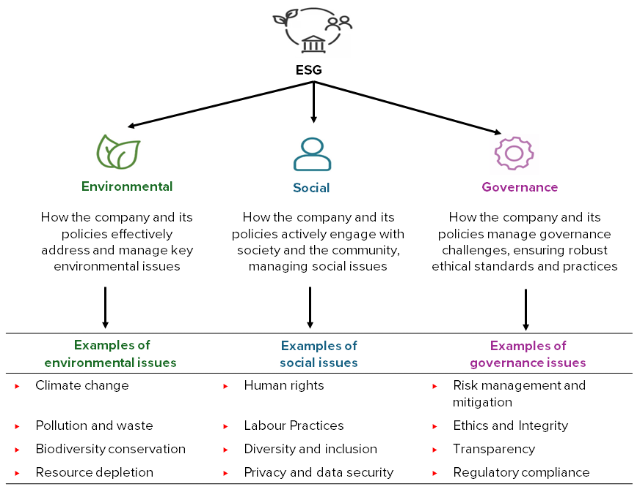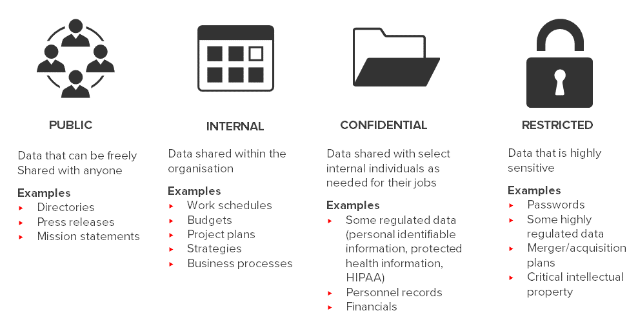Environmental, Social, and Governance (ESG) considerations have gained significant importance in evaluating a company's sustainability and ethical position. In terms of data security and privacy within the ESG domain, the focus lies on how organisations handle, protect, and utilise sensitive data related to environmental impact, social responsibility, and corporate governance. Let's delve into why organisations benefit from prioritising data security and privacy within the ESG framework to grasp how it elevates customer trust, reinforces relationships, and fosters a more sustainable and ethical business environment.

To bolster data security and privacy within Environmental, Social, and Governance (ESG) initiatives, organisations must adopt a comprehensive approach that addresses various facets of data management and protection. Here are some essential strategies for organisations to consider:
DIAGRAM: COMMON DATA CLASSIFICATION DEFINITIONS

Data Security versus Data Privacy within ESG
Data security and privacy within the ESG (Environmental, Social, and Governance) framework prioritise the protection of sensitive information and the preservation of individuals' rights, while also acknowledging broader societal and environmental considerations. Here's an overview highlighting the primary distinctions between data security and privacy within the ESG context:- Data Security: Data security encompasses the deployment of protective measures aimed at shielding information from unauthorised access, breaches, and cyber threats. It includes the implementation of encryption, access controls, and various technical safeguards to ensure the confidentiality, integrity, and availability of ESG data.
- Data Privacy: Conversely, Data Privacy emphasises the importance of upholding individual privacy rights and meeting regulatory standards during the collection, processing, and sharing of ESG-related data. This includes acquiring consent, anonymising personally identifiable information, and complying with data protection laws like PDPA, GDPR, and other applicable regulations.
ESG Issues and Areas of Concern
ESG matters cover a wide spectrum of concerns that are gaining significance for companies, investors, and stakeholders to tackle. Here's an overview of ESG issues, with a particular focus on data security and privacy considerations:
Importance of Strengthening Data Security and Privacy within ESG
Data security and privacy are vital for safeguarding individuals' personal information, preventing identity theft and fraud, upholding business trust and reputation, complying with regulations, safeguarding confidential business data, and ensuring national security and cybersecurity. Breaches in data security and privacy can lead to severe consequences including financial losses, legal penalties, damage to reputation, and threats to national security.To bolster data security and privacy within Environmental, Social, and Governance (ESG) initiatives, organisations must adopt a comprehensive approach that addresses various facets of data management and protection. Here are some essential strategies for organisations to consider:
- Risk Assessment and Management: Regularly evaluate risks to identify vulnerabilities and threats to the security and privacy of ESG data. Develop effective strategies to manage and mitigate these risks.
- Data Minimisation and Classification: Collect only necessary ESG data and classify it based on sensitivity. Implement appropriate access controls and encryption methods. (see diagram: Common Data Classification Definition below)
- Strong Authentication and Access Controls: Use robust authentication methods like multi-factor authentication (MFA) and role-based access controls (RBAC) to prevent unauthorised access to sensitive ESG data.
- Encryption and Data Masking: Encrypt ESG data during transit and at rest to prevent unauthorised access. Employ data masking techniques to anonymise personally identifiable information (PII) and sensitive data.
- Employee Training and Awareness: Provide comprehensive training on best practices for data security and privacy. Educate employees about the importance of protecting ESG data and how to respond to security threats effectively.
- Third-Party Risk Management: Assess and monitor the security practices of third-party vendors handling ESG data. Establish clear contractual agreements that outline data security requirements and responsibilities.
- Regular Security Audits and Monitoring: Conduct periodic security audits to assess existing controls and identify areas for improvement. Implement continuous monitoring mechanisms to detect and respond to security incidents promptly.
- Data Governance Framework: Establish policies, procedures, and roles for managing ESG data within a robust data governance framework. Ensure compliance with relevant regulations and standards.
- Incident Response Plan: Develop and maintain a specific plan for responding to security incidents involving ESG data. Define procedures for reporting, investigating, and mitigating breaches effectively.
- Transparency and Accountability: Promote transparency by regularly communicating data security and privacy practices to stakeholders. Provide information about data handling processes and compliance efforts to foster trust and confidence.
DIAGRAM: COMMON DATA CLASSIFICATION DEFINITIONS

Source: https://www.sfmagazine.com/articles/2021/december/the-critical-first-step-to-data-security
Perspectives on Data Security and Privacy for ESG in 2024 and Beyond
In the context of ESG matters for organisations, data security, and privacy will be shaped by a combination of regulatory compliance, ethical principles, technological innovation, supply chain collaboration, and stakeholder engagement. Prioritising data security and privacy within their ESG strategies enables organisations to reduce risks, cultivate trust, and create sustainable value for all stakeholders. Looking ahead, the landscape of data security and privacy within ESG space for organisations is set to undergo significant transformative shifts.- As ESG factors gain prominence among investors, regulators, and other stakeholders, data security and privacy metrics will be seamlessly integrated into ESG reporting frameworks. This will necessitate organisations to divulge details about their data management practices, cybersecurity protocols, and privacy policies alongside traditional ESG metrics.
- Governments and regulatory bodies will persist in fortifying data protection laws and imposing stricter penalties for non-compliance. Organisations operating across multiple jurisdictions will face the challenge of navigating a complex regulatory terrain and ensuring alignment with evolving data privacy standards to mitigate legal risks.
- Ethical considerations will assume a pivotal role in shaping data governance practices within ESG frameworks. Organisations will be expected to prioritise fairness, transparency, and accountability in their data management processes, encompassing the mitigation of biases in algorithms, safeguarding individual privacy rights, and fostering responsible data stewardship.
- In response to mounting concerns regarding data privacy, there will be a heightened uptake of privacy-preserving technologies such as differential privacy, homomorphic encryption, and federated learning. These technologies enable organisations to glean insights from data while safeguarding individual privacy, addressing regulatory requirements, and fostering trust with stakeholders.
- Organisations will broaden their focus on data security and privacy beyond internal operations to encompass their supply chains. Expectations for supply chain partners to adhere to stringent data protection standards will rise, prompting organisations to implement measures for evaluating and mitigating data security risks throughout the supply chain ecosystem.
- The escalating threat landscape of cyberattacks and data breaches will propel organisations to invest in bolstering cybersecurity resilience. This will encompass the deployment of advanced threat detection technologies, regular security audits and assessments, and the enhancement of incident response capabilities to minimise the repercussions of data security incidents.
- Stakeholders, including investors, customers, employees, and communities, will increasingly demand transparency and engagement regarding organisations' data security and privacy practices. Organisations will need to proactively communicate their ESG-driven data management strategies, address stakeholder concerns, and demonstrate ongoing improvement in data security and privacy performance.
Conclusion
Organisations need to make data security and privacy a top priority within the ESG framework for multiple compelling reasons. This emphasis helps to build trust, maintain legal compliance, reduce risks, and instil confidence among stakeholders. Furthermore, by prioritising data security and privacy, organisations can drive innovation, uphold social responsibility, and uphold a positive reputation, aligning with their overall ESG goals and objectives. Essentially, a heightened emphasis on data security and privacy is crucial not just for ethical business practices but also for ensuring long-term sustainability and success within the ESG landscape.References
- ESG data can keep businesses accountable, but only if it can be trusted: https://www.weforum.org/agenda/2023/05/how-governments-can-use-esg-data-to-reach-net-zero/
- World Economic Forum - The Global Risks Report 2024, 19th Edition: https://www3.weforum.org/docs/WEF_The_Global_Risks_Report_2024.pdf
- Personal Data Protection Act (PDPA), Singapore: https://www.pdpc.gov.sg/overview-of-pdpa/the-legislation/personal-data-protection-act
- General Data Protection Regulation (GDPR), Europe: https://commission.europa.eu/law/law-topic/data-protection_en
- Data privacy, security, and human capital present material ESG risks for blockchain funds: https://www.businesstimes.com.sg/companies-markets/banking-finance/data-privacy-security-human-capital-present-material-esg-risks
- Why Cybersecurity Is the Biggest Hidden ESG Risk: https://www.nomuraconnects.com/focused-thinking-posts/why-cybersecurity-is-the-biggest-hidden-esg-risk/#:~:text=Cybercrime%20affects%20individual%20enterprises%20through,and%20generate%20significant%20litigation%20risk.

